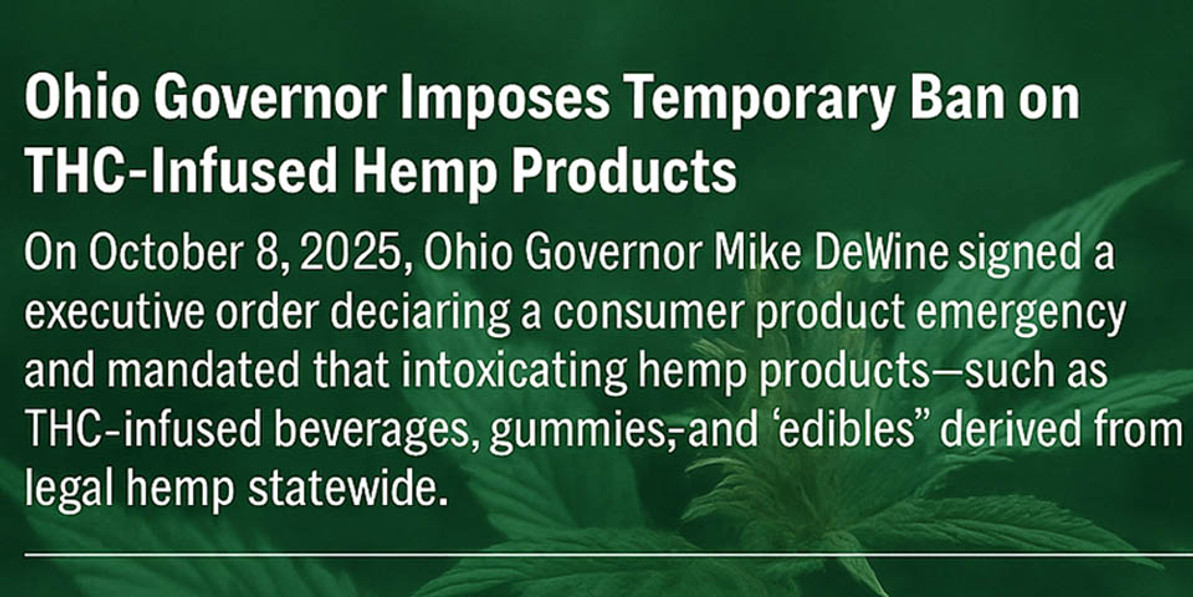Hemp, Soil, and Scheduling: A Crossroads in U.S. Cannabis Policy
COLUMBUS, Ohio / WASHINGTON, D.C. — A swirl of developments in state regulation, federal scheduling, and cultivation science is reshaping the landscape of hemp, THC products, and cannabis policy across the U.S.
Ohio Governor Imposes Temporary Ban on THC-Infused Hemp Products
On October 8, 2025, Ohio Governor Mike DeWine signed an executive order declaring a consumer product emergency and mandated that intoxicating hemp products—such as THC-infused beverages, gummies, and “edibles” derived from legal hemp—be pulled from shelves statewide. Cannabis Business Times+3https://www.fox19.com+3Craft Brewing Business+3
The ban takes effect October 14 at 12:01 a.m. and lasts 90 days, unless extended by the Ohio legislature. https://www.fox19.com+1 Any unsold stock must be returned to manufacturers or surrendered to law enforcement. https://www.fox19.com+1
DeWine cited concerns over the lack of oversight and potential public health risks, noting that Ohio lawmakers had not yet enacted clear regulations for hemp-derived products. Craft Brewing Business+2The Statehouse News Bureau+2 Ohio brewers and some industry stakeholders have expressed pushback, arguing the order creates uncertainty and upsets market expectations. Craft Brewing Business
Soil Matters: How Soil Quality Shapes THC, CBD, and Terpene Profiles
In a federally funded study recently published in the Journal of Medicinally Active Plants, researchers examined how soil conditions influence the chemical profile of hemp (Cannabis sativa). They found that poorer soil quality correlates with higher THC concentrations, while richer soils tend to promote higher levels of precursor compounds such as CBG (cannabigerol). Marijuana Moment
This has major implications for hemp growers: subtle variations in soil nutrients, microbial life, and soil health may push THC levels (which must remain under legal thresholds in hemp) beyond permissible limits. The authors suggest that optimizing soil conditions can be a control point for consistent, compliant cannabinoid profiles. Marijuana Moment
Previous research has also shown that light, nutrient availability, and microbial interactions affect terpene expression and cannabinoid ratios — reinforcing that cultivation variables go well beyond genetics. PMC+1
Federal Rescheduling Hangs in Limbo
On the federal front, momentum for rescheduling cannabis — moving it from Schedule I to Schedule III under the Controlled Substances Act — remains stalled. CannaCon+3Marijuana Moment+3Cannabis Business Times+3
Under the Biden administration, the Department of Health and Human Services recommended the shift, concluding cannabis has medical utility and a lower potential for abuse than Schedule I substances. National Law Review+3moritzlaw.osu.edu+3Marijuana Moment+3 But since President Trump took office again, the rulemaking process has faced delays, administrative transitions, and procedural roadblocks. Cannabis Business Times+4Marijuana Moment+4Cannabis Business Times+4
A January 2025 hearing was postponed, and as of mid-2025 no new briefing schedule has been set for the appeal process. CannaCon+3DEA+3Marijuana Moment+3 Under current leadership, the new DEA administrator, Terrance Cole, has omitted rescheduling from his top strategic priorities — a departure from earlier commitments. Cannabis Business Times+3Cannabis Business Times+3Cannabis Business Times+3
Moreover, some members of Congress are actively trying to block DOJ’s authority to reclassify cannabis via funding restrictions. Cannabis Business Times+2Dentons+2
Analysts warn that even if cannabis is relisted to Schedule III, many legal conflicts (between state and federal law, taxation, banking, research) will remain unresolved, limiting the practical impact of the change. MPP+3STAT+3Dentons+3
President Trump has publicly commented that he is “looking at” rescheduling but has not committed to concrete action. Marijuana Moment+3Marijuana Moment+3Cannabis Business Times+3
Tensions, Stakeholders, and the Road Ahead
These intersecting trends — state crackdowns, cultivation science, and federal policy inertia — highlight the friction in U.S. cannabis reform.
- For states: Patchwork regulation and emergent products demand fast responses, even if temporary.
- For growers: The new soil study underscores that cultivation protocols must closely monitor soil health if THC thresholds are to be reliably met.
- For the industry: The stalled rescheduling process prolongs uncertainty over tax liability (e.g. Section 280E), access to banking, and legitimacy in federal scrutiny.
- For policymakers: The challenge is balancing public health, market stability, and regulatory clarity — all while legal definitions and scientific insights evolve.
Ohio’s 90-day ban may well become a bellwether: if the legislature moves to codify or reject it, that will send signals to other states. Meanwhile, until the federal rescheduling path clears, many operators and advocates remain in a holding pattern.
Shop Our Online Headshop For Glass Bongs, Silicone Bongs and Acrylic Bongs
**The beliefs and opinions expressed in this blog are not those of Waterbeds 'n' Stuff.
Want more cannabis education, news, and product tips?
Subscribe to our newsletter or follow us on social media.
Explore More:
Recent Posts
-
Valentine’s Day Gift Ideas That Go Beyond Chocolate & Flowers ❤️
Unforgettable surprises for every kind of lover Valentine’s Day is the perfect excuse to slow down, …Jan 27, 2026 -
18mm vs 19mm Bong Joints: What’s the Real Difference?
If you’ve ever tried to buy a new bowl, banger, or downstem for your bong, you’ve probably run into …Jan 12, 2026 -
Ohio Marijuana & CBD Laws 2025: The Real Story on Issue 2, Delta-8 & Hemp
Updated: December 8, 2025 Ohio’s cannabis laws have changed rapidly since voters approved Issue 2 i …Dec 08, 2025




